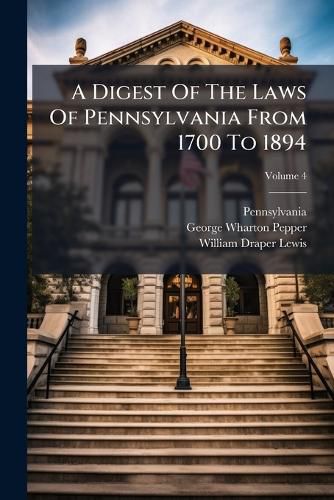Readings Newsletter
Become a Readings Member to make your shopping experience even easier.
Sign in or sign up for free!
You’re not far away from qualifying for FREE standard shipping within Australia
You’ve qualified for FREE standard shipping within Australia
The cart is loading…






"A Digest Of The Laws Of Pennsylvania From 1700 To 1894" is a comprehensive legal resource, presenting a thorough compilation of Pennsylvania's laws spanning nearly two centuries. This fourth volume includes the Constitution of the United States and the Constitution of the State of Pennsylvania, extensively annotated with notes and references to pertinent court decisions. Compiled by the state of Pennsylvania, with annotations by George Wharton Pepper and William Draper Lewis, this digest serves as an invaluable reference for legal professionals, historians, and anyone seeking a deep understanding of Pennsylvania's legal framework during this transformative period. Its meticulous organization and detailed annotations make it an essential addition to any legal library, offering insights into the evolution of American law and jurisprudence.
This work has been selected by scholars as being culturally important, and is part of the knowledge base of civilization as we know it. This work was reproduced from the original artifact, and remains as true to the original work as possible. Therefore, you will see the original copyright references, library stamps (as most of these works have been housed in our most important libraries around the world), and other notations in the work.
This work is in the public domain in the United States of America, and possibly other nations. Within the United States, you may freely copy and distribute this work, as no entity (individual or corporate) has a copyright on the body of the work.
As a reproduction of a historical artifact, this work may contain missing or blurred pages, poor pictures, errant marks, etc. Scholars believe, and we concur, that this work is important enough to be preserved, reproduced, and made generally available to the public. We appreciate your support of the preservation process, and thank you for being an important part of keeping this knowledge alive and relevant.
$9.00 standard shipping within Australia
FREE standard shipping within Australia for orders over $100.00
Express & International shipping calculated at checkout
Stock availability can be subject to change without notice. We recommend calling the shop or contacting our online team to check availability of low stock items. Please see our Shopping Online page for more details.
"A Digest Of The Laws Of Pennsylvania From 1700 To 1894" is a comprehensive legal resource, presenting a thorough compilation of Pennsylvania's laws spanning nearly two centuries. This fourth volume includes the Constitution of the United States and the Constitution of the State of Pennsylvania, extensively annotated with notes and references to pertinent court decisions. Compiled by the state of Pennsylvania, with annotations by George Wharton Pepper and William Draper Lewis, this digest serves as an invaluable reference for legal professionals, historians, and anyone seeking a deep understanding of Pennsylvania's legal framework during this transformative period. Its meticulous organization and detailed annotations make it an essential addition to any legal library, offering insights into the evolution of American law and jurisprudence.
This work has been selected by scholars as being culturally important, and is part of the knowledge base of civilization as we know it. This work was reproduced from the original artifact, and remains as true to the original work as possible. Therefore, you will see the original copyright references, library stamps (as most of these works have been housed in our most important libraries around the world), and other notations in the work.
This work is in the public domain in the United States of America, and possibly other nations. Within the United States, you may freely copy and distribute this work, as no entity (individual or corporate) has a copyright on the body of the work.
As a reproduction of a historical artifact, this work may contain missing or blurred pages, poor pictures, errant marks, etc. Scholars believe, and we concur, that this work is important enough to be preserved, reproduced, and made generally available to the public. We appreciate your support of the preservation process, and thank you for being an important part of keeping this knowledge alive and relevant.